Human Resource Management Analysis: Unilever UK Case Study Report
VerifiedAdded on 2020/12/30
|20
|4695
|306
Report
AI Summary
This report provides a comprehensive analysis of Human Resource Management (HRM) practices at Unilever UK. It begins with an introduction to HRM, defining its purpose and functions within an organization, and then gives an overview of Unilever UK, including its mission, objectives, and core values. The report delves into the key approaches to HRM, such as workforce planning, recruitment and selection, training and development, and performance management, outlining the strengths and weaknesses of each. It also examines the roles and responsibilities of the HR department, including managerial, operative, and advisory functions. Furthermore, the report explores the benefits of these HRM practices for both the employer and the employees, highlighting how recruitment, training, and performance management contribute to organizational success and employee satisfaction. The report concludes with a discussion of relevant legislation impacting Unilever UK's HRM practices, offering insights into the company's overall HR strategy and its impact on the workforce.

Unit 03– Human Resource
Management
Management
Paraphrase This Document
Need a fresh take? Get an instant paraphrase of this document with our AI Paraphraser

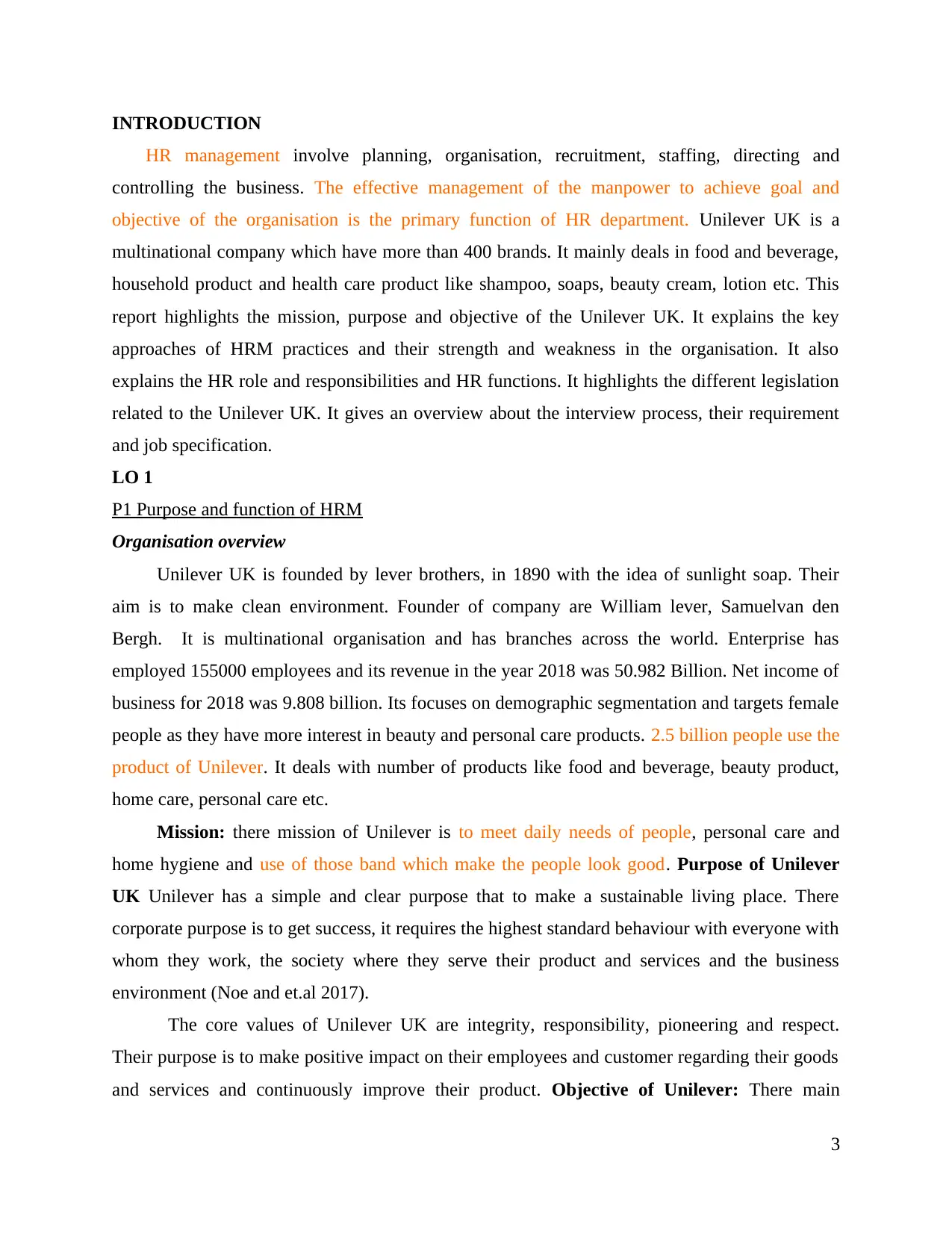
INTRODUCTION
HR management involve planning, organisation, recruitment, staffing, directing and
controlling the business. The effective management of the manpower to achieve goal and
objective of the organisation is the primary function of HR department. Unilever UK is a
multinational company which have more than 400 brands. It mainly deals in food and beverage,
household product and health care product like shampoo, soaps, beauty cream, lotion etc. This
report highlights the mission, purpose and objective of the Unilever UK. It explains the key
approaches of HRM practices and their strength and weakness in the organisation. It also
explains the HR role and responsibilities and HR functions. It highlights the different legislation
related to the Unilever UK. It gives an overview about the interview process, their requirement
and job specification.
LO 1
P1 Purpose and function of HRM
Organisation overview
Unilever UK is founded by lever brothers, in 1890 with the idea of sunlight soap. Their
aim is to make clean environment. Founder of company are William lever, Samuelvan den
Bergh. It is multinational organisation and has branches across the world. Enterprise has
employed 155000 employees and its revenue in the year 2018 was 50.982 Billion. Net income of
business for 2018 was 9.808 billion. Its focuses on demographic segmentation and targets female
people as they have more interest in beauty and personal care products. 2.5 billion people use the
product of Unilever. It deals with number of products like food and beverage, beauty product,
home care, personal care etc.
Mission: there mission of Unilever is to meet daily needs of people, personal care and
home hygiene and use of those band which make the people look good. Purpose of Unilever
UK Unilever has a simple and clear purpose that to make a sustainable living place. There
corporate purpose is to get success, it requires the highest standard behaviour with everyone with
whom they work, the society where they serve their product and services and the business
environment (Noe and et.al 2017).
The core values of Unilever UK are integrity, responsibility, pioneering and respect.
Their purpose is to make positive impact on their employees and customer regarding their goods
and services and continuously improve their product. Objective of Unilever: There main
3
HR management involve planning, organisation, recruitment, staffing, directing and
controlling the business. The effective management of the manpower to achieve goal and
objective of the organisation is the primary function of HR department. Unilever UK is a
multinational company which have more than 400 brands. It mainly deals in food and beverage,
household product and health care product like shampoo, soaps, beauty cream, lotion etc. This
report highlights the mission, purpose and objective of the Unilever UK. It explains the key
approaches of HRM practices and their strength and weakness in the organisation. It also
explains the HR role and responsibilities and HR functions. It highlights the different legislation
related to the Unilever UK. It gives an overview about the interview process, their requirement
and job specification.
LO 1
P1 Purpose and function of HRM
Organisation overview
Unilever UK is founded by lever brothers, in 1890 with the idea of sunlight soap. Their
aim is to make clean environment. Founder of company are William lever, Samuelvan den
Bergh. It is multinational organisation and has branches across the world. Enterprise has
employed 155000 employees and its revenue in the year 2018 was 50.982 Billion. Net income of
business for 2018 was 9.808 billion. Its focuses on demographic segmentation and targets female
people as they have more interest in beauty and personal care products. 2.5 billion people use the
product of Unilever. It deals with number of products like food and beverage, beauty product,
home care, personal care etc.
Mission: there mission of Unilever is to meet daily needs of people, personal care and
home hygiene and use of those band which make the people look good. Purpose of Unilever
UK Unilever has a simple and clear purpose that to make a sustainable living place. There
corporate purpose is to get success, it requires the highest standard behaviour with everyone with
whom they work, the society where they serve their product and services and the business
environment (Noe and et.al 2017).
The core values of Unilever UK are integrity, responsibility, pioneering and respect.
Their purpose is to make positive impact on their employees and customer regarding their goods
and services and continuously improve their product. Objective of Unilever: There main
3
⊘ This is a preview!⊘
Do you want full access?
Subscribe today to unlock all pages.

Trusted by 1+ million students worldwide

objective is to help the people in improving their health and wellbeing to improve the livelihoods
of thousands of people and to halve the carbon footprint in environment. Unilever UK objective
is to increase their sales by satisfy their customer. Their objective is to expand their business by
offering different product and services and to open new units. They also want to increase their
profit and work for the sustainable environment. Their objective is to focus on food product as
well as personal care and household product.
Purpose and function of HRM
The purpose of Human resource management is to staff and control, organise, direct,
plan, the human resource in the organisation (Albrecht and et.al 2015).
Purpose of HRM
Manager of the HR department work as a link between the top management and the
employees. Manager solves the problem of the organisation and improve the organisational
relationship. HR reports the issues of employees to the top management and pass the important
information from top management to employees. Purpose of HR manager is to recruit skilled
people in organisation. HR manager maintain the employees in Unilever. HR maintains the
adequate manpower in the organisation by regulating the work of staff in the organisation. They
give training to the employees who are new to organisation and existing employees to improve
the employee ability. Another purpose is to lead the employees. HR manager lead the employees
of Unilever in proper direction to achieve the objectives. They communicate with the employee
and adopt them to the Unilever UK culture, norms and business environment.
Roles and responsibilities of HR function
HR plays a different role in the organisation. The function of HR is planning, organising,
staffing, directing, controlling, training, procurement, development, compensation, maintenance
and motivation.
Managerial function
Planning: Its HR responsibility to plan a recruit right people for the organisation. HR
manager recruit the employees by different method like internal and external recruitment.
HR manager designs the job profile, source candidates, conduct interview and select the
candidates. Unilever select those candidates who are highly dedicated toward their work.
4
of thousands of people and to halve the carbon footprint in environment. Unilever UK objective
is to increase their sales by satisfy their customer. Their objective is to expand their business by
offering different product and services and to open new units. They also want to increase their
profit and work for the sustainable environment. Their objective is to focus on food product as
well as personal care and household product.
Purpose and function of HRM
The purpose of Human resource management is to staff and control, organise, direct,
plan, the human resource in the organisation (Albrecht and et.al 2015).
Purpose of HRM
Manager of the HR department work as a link between the top management and the
employees. Manager solves the problem of the organisation and improve the organisational
relationship. HR reports the issues of employees to the top management and pass the important
information from top management to employees. Purpose of HR manager is to recruit skilled
people in organisation. HR manager maintain the employees in Unilever. HR maintains the
adequate manpower in the organisation by regulating the work of staff in the organisation. They
give training to the employees who are new to organisation and existing employees to improve
the employee ability. Another purpose is to lead the employees. HR manager lead the employees
of Unilever in proper direction to achieve the objectives. They communicate with the employee
and adopt them to the Unilever UK culture, norms and business environment.
Roles and responsibilities of HR function
HR plays a different role in the organisation. The function of HR is planning, organising,
staffing, directing, controlling, training, procurement, development, compensation, maintenance
and motivation.
Managerial function
Planning: Its HR responsibility to plan a recruit right people for the organisation. HR
manager recruit the employees by different method like internal and external recruitment.
HR manager designs the job profile, source candidates, conduct interview and select the
candidates. Unilever select those candidates who are highly dedicated toward their work.
4
Paraphrase This Document
Need a fresh take? Get an instant paraphrase of this document with our AI Paraphraser

Organising and directing: It is another responsibility of Hr function; Human resource
team has to direct people and must manage them so that they can be profitable for
organisation
Operative function
Performance appraisal: Total system efficiency is the belief of organisation in
comparison to individual efficiency. To improve the performance of organisation they
have to work on the individual performance. HR manger must evaluate the performance
of each employee and appraise them according to their work and dedication.
Training and development: Proper training has been provided to the employees of the
organisation in order to improve the skills of the employees. They organise many
development programmes in the company to develop the knowledge of employees. HR
manager has responsibility to find the needs and weakness of employee and give them
training according to the requirement. The training programme helps them to improve
their communication skills and help the customer and serve them in a better way.
Unilever provide future leader programme to their employees. It is design to develop the
leadership among the employees by providing them challenging and purposeful
opportunities. In these programmes they rotate the employees to different functional area.
Its HR responsibility to organise this programme time to time in Unilever UK.
Advisory function
Human resource department is responsible to give suggestions to top management about
handling of employees and managing them. They time to time discuss with top
management and get to know issues faced by workers. Accordingly, HR function is to
advise them so that managers can deal with staff properly. Furthermore, they play the
role of advisor, as they give suggestions to department head so that overall productivity
can be improved.
P2 Approaches to recruitment and selection
Work force planning:
Work force planning refers to identify the current need of manpower in the organisation
and the future capital. HR is responsible to recruit the right person for right job in the company.
Various approaches for the work force planning are: (Heric 2019).
Quantitative approach
5
team has to direct people and must manage them so that they can be profitable for
organisation
Operative function
Performance appraisal: Total system efficiency is the belief of organisation in
comparison to individual efficiency. To improve the performance of organisation they
have to work on the individual performance. HR manger must evaluate the performance
of each employee and appraise them according to their work and dedication.
Training and development: Proper training has been provided to the employees of the
organisation in order to improve the skills of the employees. They organise many
development programmes in the company to develop the knowledge of employees. HR
manager has responsibility to find the needs and weakness of employee and give them
training according to the requirement. The training programme helps them to improve
their communication skills and help the customer and serve them in a better way.
Unilever provide future leader programme to their employees. It is design to develop the
leadership among the employees by providing them challenging and purposeful
opportunities. In these programmes they rotate the employees to different functional area.
Its HR responsibility to organise this programme time to time in Unilever UK.
Advisory function
Human resource department is responsible to give suggestions to top management about
handling of employees and managing them. They time to time discuss with top
management and get to know issues faced by workers. Accordingly, HR function is to
advise them so that managers can deal with staff properly. Furthermore, they play the
role of advisor, as they give suggestions to department head so that overall productivity
can be improved.
P2 Approaches to recruitment and selection
Work force planning:
Work force planning refers to identify the current need of manpower in the organisation
and the future capital. HR is responsible to recruit the right person for right job in the company.
Various approaches for the work force planning are: (Heric 2019).
Quantitative approach
5
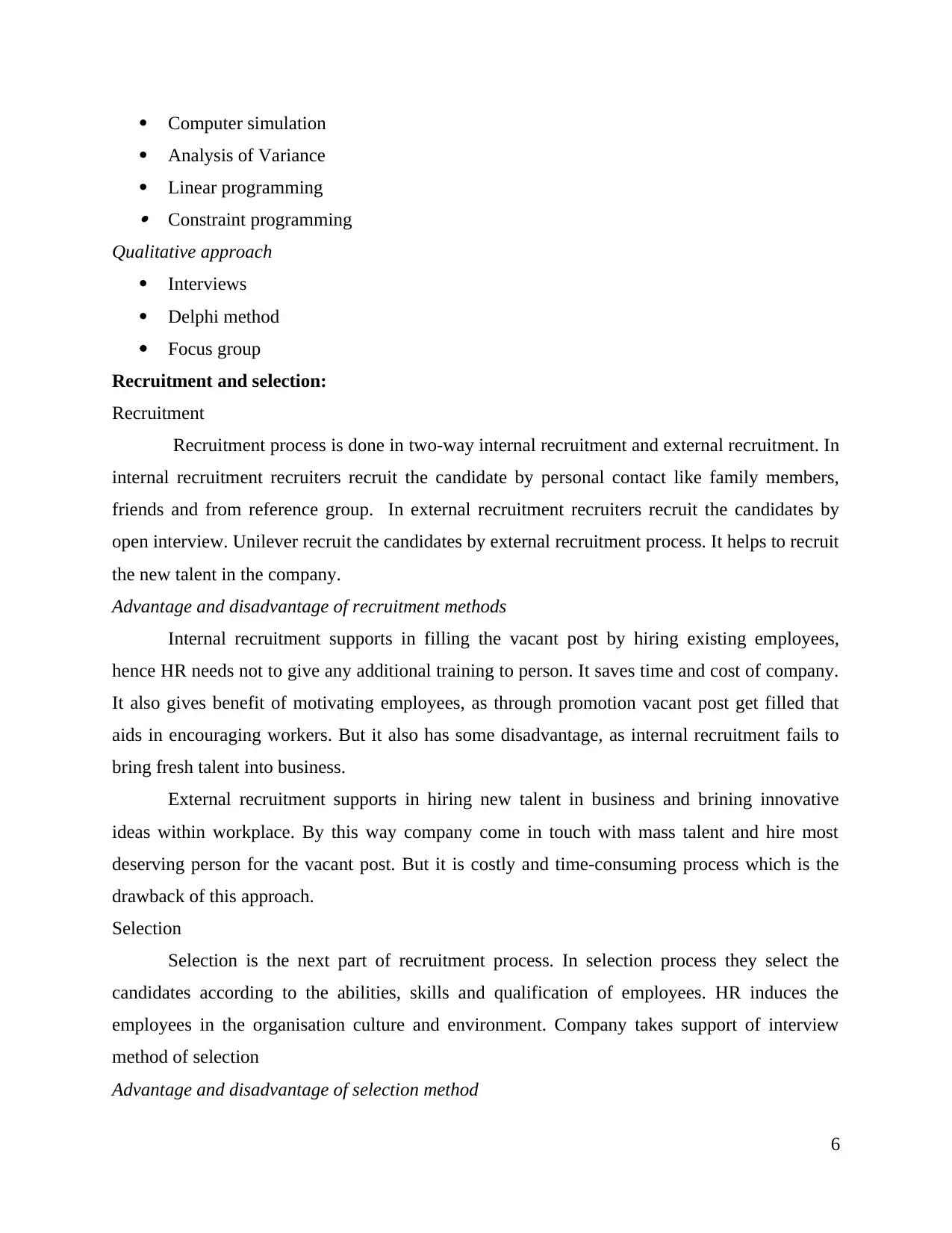
Computer simulation
Analysis of Variance
Linear programming Constraint programming
Qualitative approach
Interviews
Delphi method
Focus group
Recruitment and selection:
Recruitment
Recruitment process is done in two-way internal recruitment and external recruitment. In
internal recruitment recruiters recruit the candidate by personal contact like family members,
friends and from reference group. In external recruitment recruiters recruit the candidates by
open interview. Unilever recruit the candidates by external recruitment process. It helps to recruit
the new talent in the company.
Advantage and disadvantage of recruitment methods
Internal recruitment supports in filling the vacant post by hiring existing employees,
hence HR needs not to give any additional training to person. It saves time and cost of company.
It also gives benefit of motivating employees, as through promotion vacant post get filled that
aids in encouraging workers. But it also has some disadvantage, as internal recruitment fails to
bring fresh talent into business.
External recruitment supports in hiring new talent in business and brining innovative
ideas within workplace. By this way company come in touch with mass talent and hire most
deserving person for the vacant post. But it is costly and time-consuming process which is the
drawback of this approach.
Selection
Selection is the next part of recruitment process. In selection process they select the
candidates according to the abilities, skills and qualification of employees. HR induces the
employees in the organisation culture and environment. Company takes support of interview
method of selection
Advantage and disadvantage of selection method
6
Analysis of Variance
Linear programming Constraint programming
Qualitative approach
Interviews
Delphi method
Focus group
Recruitment and selection:
Recruitment
Recruitment process is done in two-way internal recruitment and external recruitment. In
internal recruitment recruiters recruit the candidate by personal contact like family members,
friends and from reference group. In external recruitment recruiters recruit the candidates by
open interview. Unilever recruit the candidates by external recruitment process. It helps to recruit
the new talent in the company.
Advantage and disadvantage of recruitment methods
Internal recruitment supports in filling the vacant post by hiring existing employees,
hence HR needs not to give any additional training to person. It saves time and cost of company.
It also gives benefit of motivating employees, as through promotion vacant post get filled that
aids in encouraging workers. But it also has some disadvantage, as internal recruitment fails to
bring fresh talent into business.
External recruitment supports in hiring new talent in business and brining innovative
ideas within workplace. By this way company come in touch with mass talent and hire most
deserving person for the vacant post. But it is costly and time-consuming process which is the
drawback of this approach.
Selection
Selection is the next part of recruitment process. In selection process they select the
candidates according to the abilities, skills and qualification of employees. HR induces the
employees in the organisation culture and environment. Company takes support of interview
method of selection
Advantage and disadvantage of selection method
6
⊘ This is a preview!⊘
Do you want full access?
Subscribe today to unlock all pages.

Trusted by 1+ million students worldwide
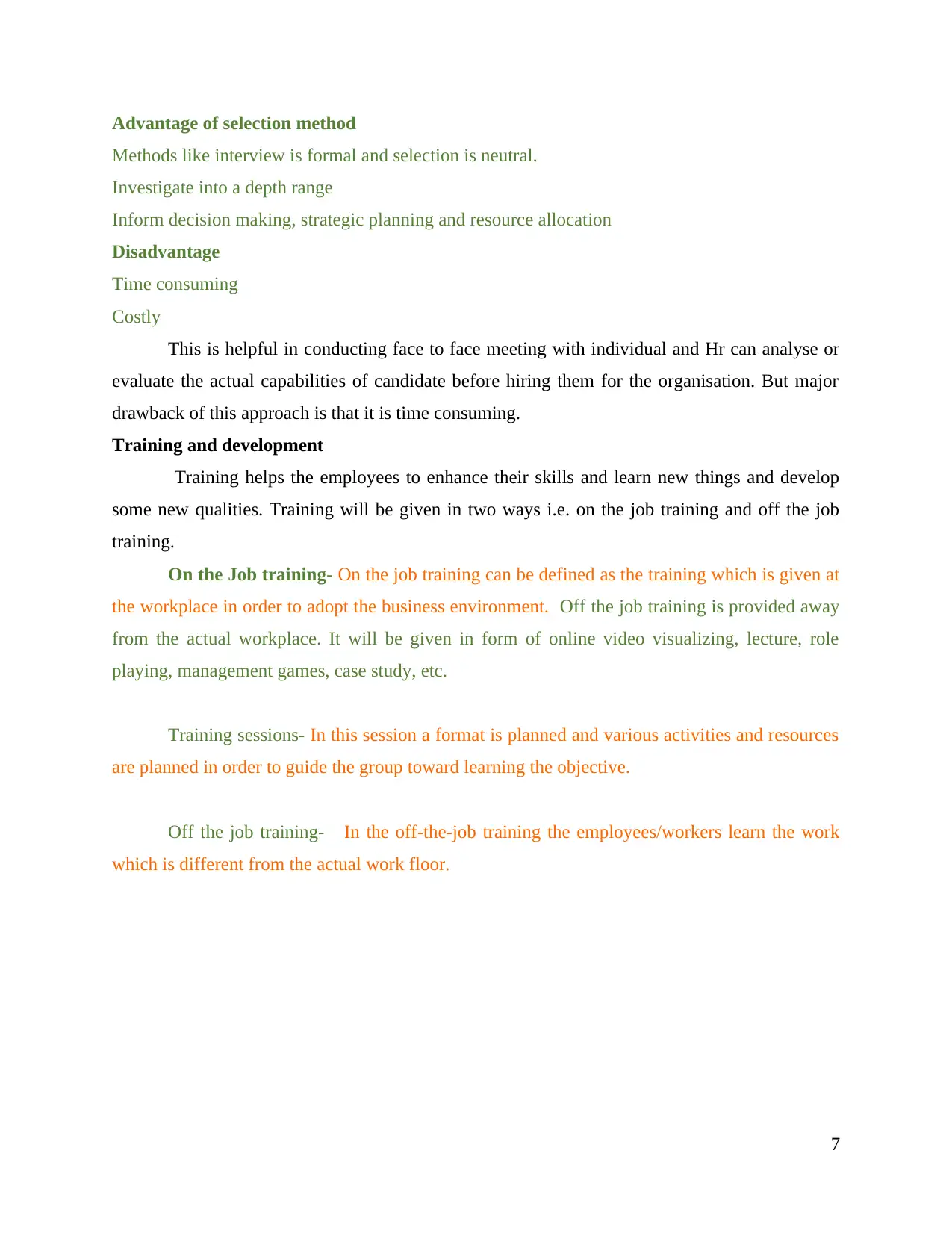
Advantage of selection method
Methods like interview is formal and selection is neutral.
Investigate into a depth range
Inform decision making, strategic planning and resource allocation
Disadvantage
Time consuming
Costly
This is helpful in conducting face to face meeting with individual and Hr can analyse or
evaluate the actual capabilities of candidate before hiring them for the organisation. But major
drawback of this approach is that it is time consuming.
Training and development
Training helps the employees to enhance their skills and learn new things and develop
some new qualities. Training will be given in two ways i.e. on the job training and off the job
training.
On the Job training- On the job training can be defined as the training which is given at
the workplace in order to adopt the business environment. Off the job training is provided away
from the actual workplace. It will be given in form of online video visualizing, lecture, role
playing, management games, case study, etc.
Training sessions- In this session a format is planned and various activities and resources
are planned in order to guide the group toward learning the objective.
Off the job training- In the off-the-job training the employees/workers learn the work
which is different from the actual work floor.
7
Methods like interview is formal and selection is neutral.
Investigate into a depth range
Inform decision making, strategic planning and resource allocation
Disadvantage
Time consuming
Costly
This is helpful in conducting face to face meeting with individual and Hr can analyse or
evaluate the actual capabilities of candidate before hiring them for the organisation. But major
drawback of this approach is that it is time consuming.
Training and development
Training helps the employees to enhance their skills and learn new things and develop
some new qualities. Training will be given in two ways i.e. on the job training and off the job
training.
On the Job training- On the job training can be defined as the training which is given at
the workplace in order to adopt the business environment. Off the job training is provided away
from the actual workplace. It will be given in form of online video visualizing, lecture, role
playing, management games, case study, etc.
Training sessions- In this session a format is planned and various activities and resources
are planned in order to guide the group toward learning the objective.
Off the job training- In the off-the-job training the employees/workers learn the work
which is different from the actual work floor.
7
Paraphrase This Document
Need a fresh take? Get an instant paraphrase of this document with our AI Paraphraser
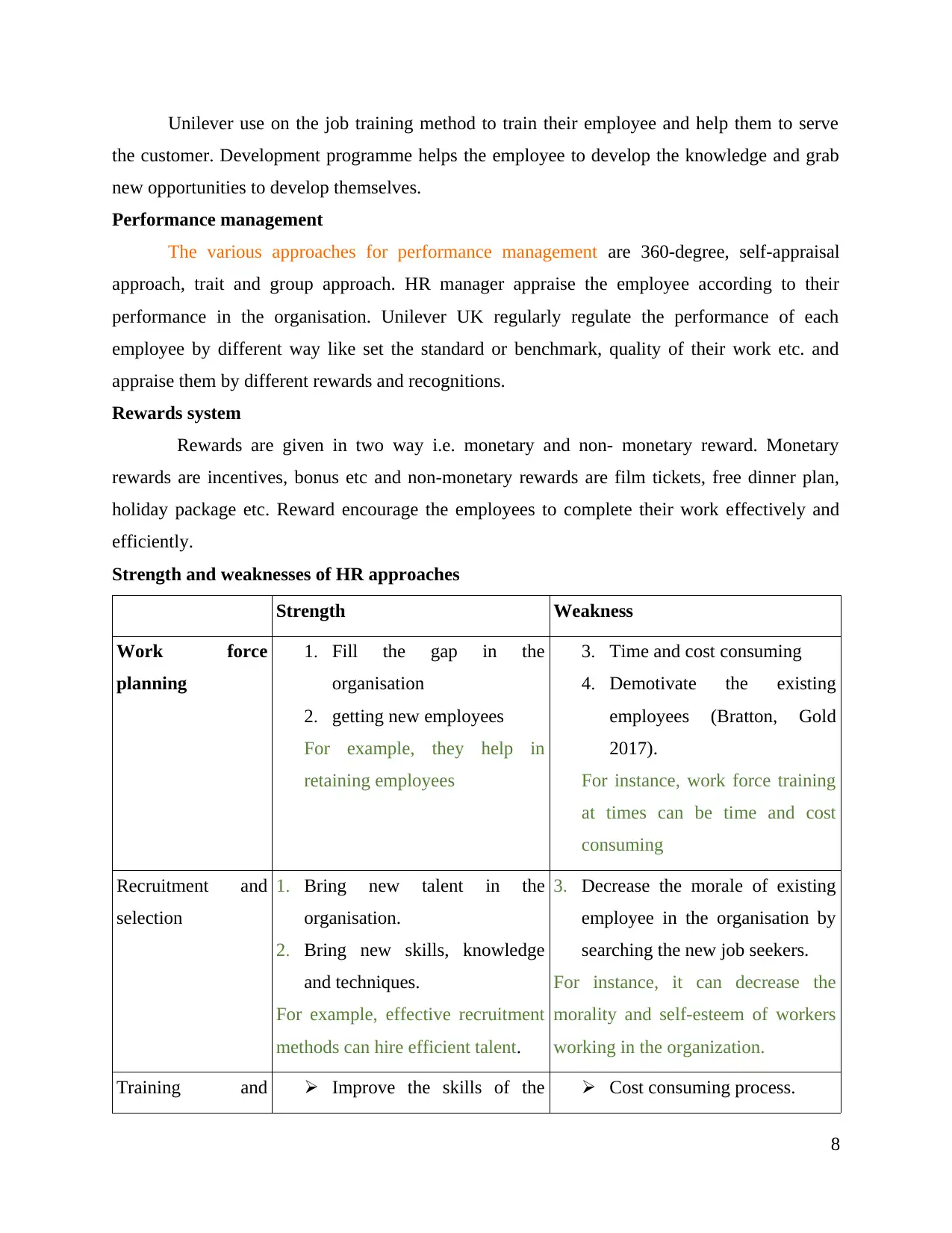
Unilever use on the job training method to train their employee and help them to serve
the customer. Development programme helps the employee to develop the knowledge and grab
new opportunities to develop themselves.
Performance management
The various approaches for performance management are 360-degree, self-appraisal
approach, trait and group approach. HR manager appraise the employee according to their
performance in the organisation. Unilever UK regularly regulate the performance of each
employee by different way like set the standard or benchmark, quality of their work etc. and
appraise them by different rewards and recognitions.
Rewards system
Rewards are given in two way i.e. monetary and non- monetary reward. Monetary
rewards are incentives, bonus etc and non-monetary rewards are film tickets, free dinner plan,
holiday package etc. Reward encourage the employees to complete their work effectively and
efficiently.
Strength and weaknesses of HR approaches
Strength Weakness
Work force
planning
1. Fill the gap in the
organisation
2. getting new employees
For example, they help in
retaining employees
3. Time and cost consuming
4. Demotivate the existing
employees (Bratton, Gold
2017).
For instance, work force training
at times can be time and cost
consuming
Recruitment and
selection
1. Bring new talent in the
organisation.
2. Bring new skills, knowledge
and techniques.
For example, effective recruitment
methods can hire efficient talent.
3. Decrease the morale of existing
employee in the organisation by
searching the new job seekers.
For instance, it can decrease the
morality and self-esteem of workers
working in the organization.
Training and Improve the skills of the Cost consuming process.
8
the customer. Development programme helps the employee to develop the knowledge and grab
new opportunities to develop themselves.
Performance management
The various approaches for performance management are 360-degree, self-appraisal
approach, trait and group approach. HR manager appraise the employee according to their
performance in the organisation. Unilever UK regularly regulate the performance of each
employee by different way like set the standard or benchmark, quality of their work etc. and
appraise them by different rewards and recognitions.
Rewards system
Rewards are given in two way i.e. monetary and non- monetary reward. Monetary
rewards are incentives, bonus etc and non-monetary rewards are film tickets, free dinner plan,
holiday package etc. Reward encourage the employees to complete their work effectively and
efficiently.
Strength and weaknesses of HR approaches
Strength Weakness
Work force
planning
1. Fill the gap in the
organisation
2. getting new employees
For example, they help in
retaining employees
3. Time and cost consuming
4. Demotivate the existing
employees (Bratton, Gold
2017).
For instance, work force training
at times can be time and cost
consuming
Recruitment and
selection
1. Bring new talent in the
organisation.
2. Bring new skills, knowledge
and techniques.
For example, effective recruitment
methods can hire efficient talent.
3. Decrease the morale of existing
employee in the organisation by
searching the new job seekers.
For instance, it can decrease the
morality and self-esteem of workers
working in the organization.
Training and Improve the skills of the Cost consuming process.
8
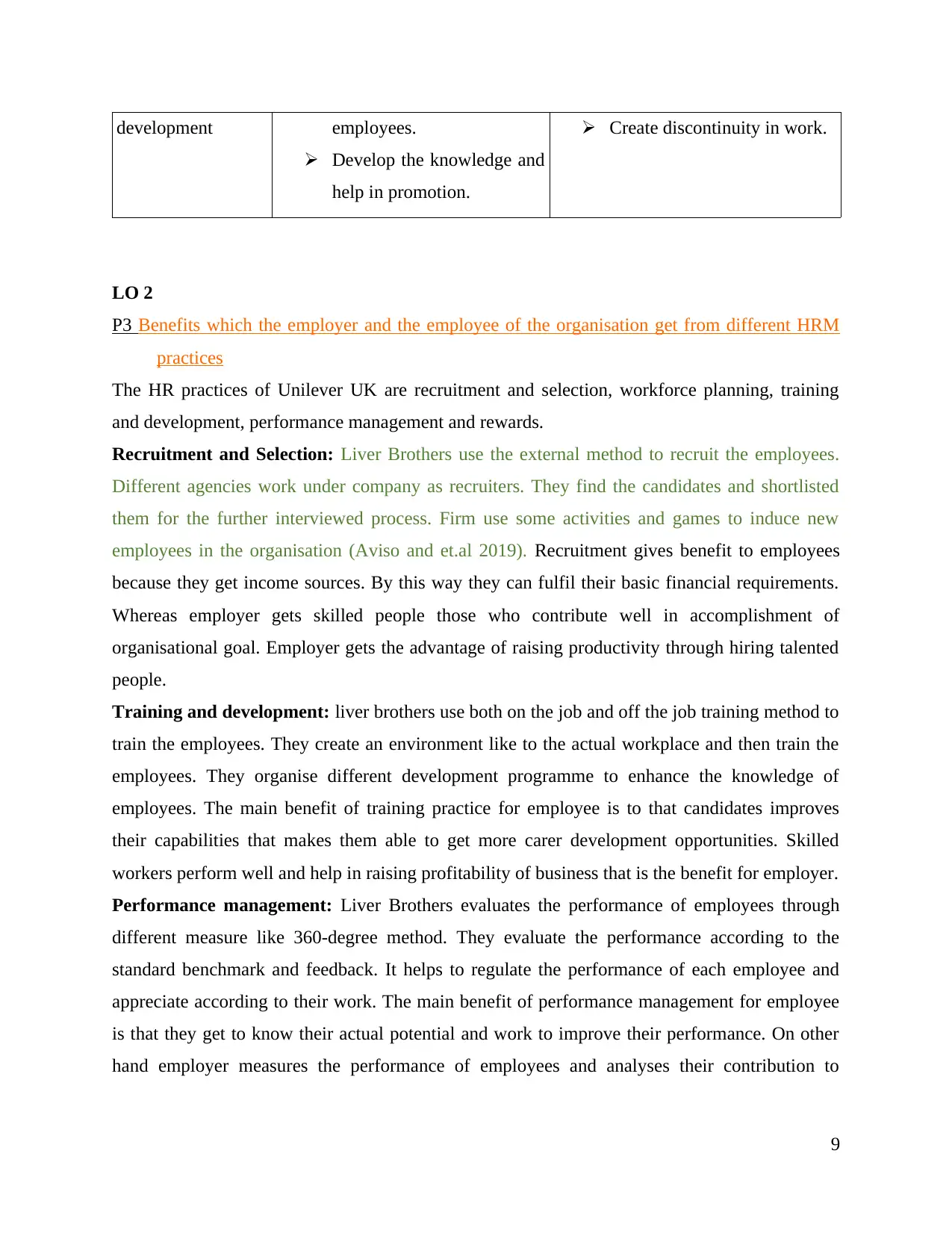
development employees.
Develop the knowledge and
help in promotion.
Create discontinuity in work.
LO 2
P3 Benefits which the employer and the employee of the organisation get from different HRM
practices
The HR practices of Unilever UK are recruitment and selection, workforce planning, training
and development, performance management and rewards.
Recruitment and Selection: Liver Brothers use the external method to recruit the employees.
Different agencies work under company as recruiters. They find the candidates and shortlisted
them for the further interviewed process. Firm use some activities and games to induce new
employees in the organisation (Aviso and et.al 2019). Recruitment gives benefit to employees
because they get income sources. By this way they can fulfil their basic financial requirements.
Whereas employer gets skilled people those who contribute well in accomplishment of
organisational goal. Employer gets the advantage of raising productivity through hiring talented
people.
Training and development: liver brothers use both on the job and off the job training method to
train the employees. They create an environment like to the actual workplace and then train the
employees. They organise different development programme to enhance the knowledge of
employees. The main benefit of training practice for employee is to that candidates improves
their capabilities that makes them able to get more carer development opportunities. Skilled
workers perform well and help in raising profitability of business that is the benefit for employer.
Performance management: Liver Brothers evaluates the performance of employees through
different measure like 360-degree method. They evaluate the performance according to the
standard benchmark and feedback. It helps to regulate the performance of each employee and
appreciate according to their work. The main benefit of performance management for employee
is that they get to know their actual potential and work to improve their performance. On other
hand employer measures the performance of employees and analyses their contribution to
9
Develop the knowledge and
help in promotion.
Create discontinuity in work.
LO 2
P3 Benefits which the employer and the employee of the organisation get from different HRM
practices
The HR practices of Unilever UK are recruitment and selection, workforce planning, training
and development, performance management and rewards.
Recruitment and Selection: Liver Brothers use the external method to recruit the employees.
Different agencies work under company as recruiters. They find the candidates and shortlisted
them for the further interviewed process. Firm use some activities and games to induce new
employees in the organisation (Aviso and et.al 2019). Recruitment gives benefit to employees
because they get income sources. By this way they can fulfil their basic financial requirements.
Whereas employer gets skilled people those who contribute well in accomplishment of
organisational goal. Employer gets the advantage of raising productivity through hiring talented
people.
Training and development: liver brothers use both on the job and off the job training method to
train the employees. They create an environment like to the actual workplace and then train the
employees. They organise different development programme to enhance the knowledge of
employees. The main benefit of training practice for employee is to that candidates improves
their capabilities that makes them able to get more carer development opportunities. Skilled
workers perform well and help in raising profitability of business that is the benefit for employer.
Performance management: Liver Brothers evaluates the performance of employees through
different measure like 360-degree method. They evaluate the performance according to the
standard benchmark and feedback. It helps to regulate the performance of each employee and
appreciate according to their work. The main benefit of performance management for employee
is that they get to know their actual potential and work to improve their performance. On other
hand employer measures the performance of employees and analyses their contribution to
9
⊘ This is a preview!⊘
Do you want full access?
Subscribe today to unlock all pages.

Trusted by 1+ million students worldwide

business. That helps in retaining them in business for longer duration and motivating them as
well.
Job Specification
10
well.
Job Specification
10
Paraphrase This Document
Need a fresh take? Get an instant paraphrase of this document with our AI Paraphraser
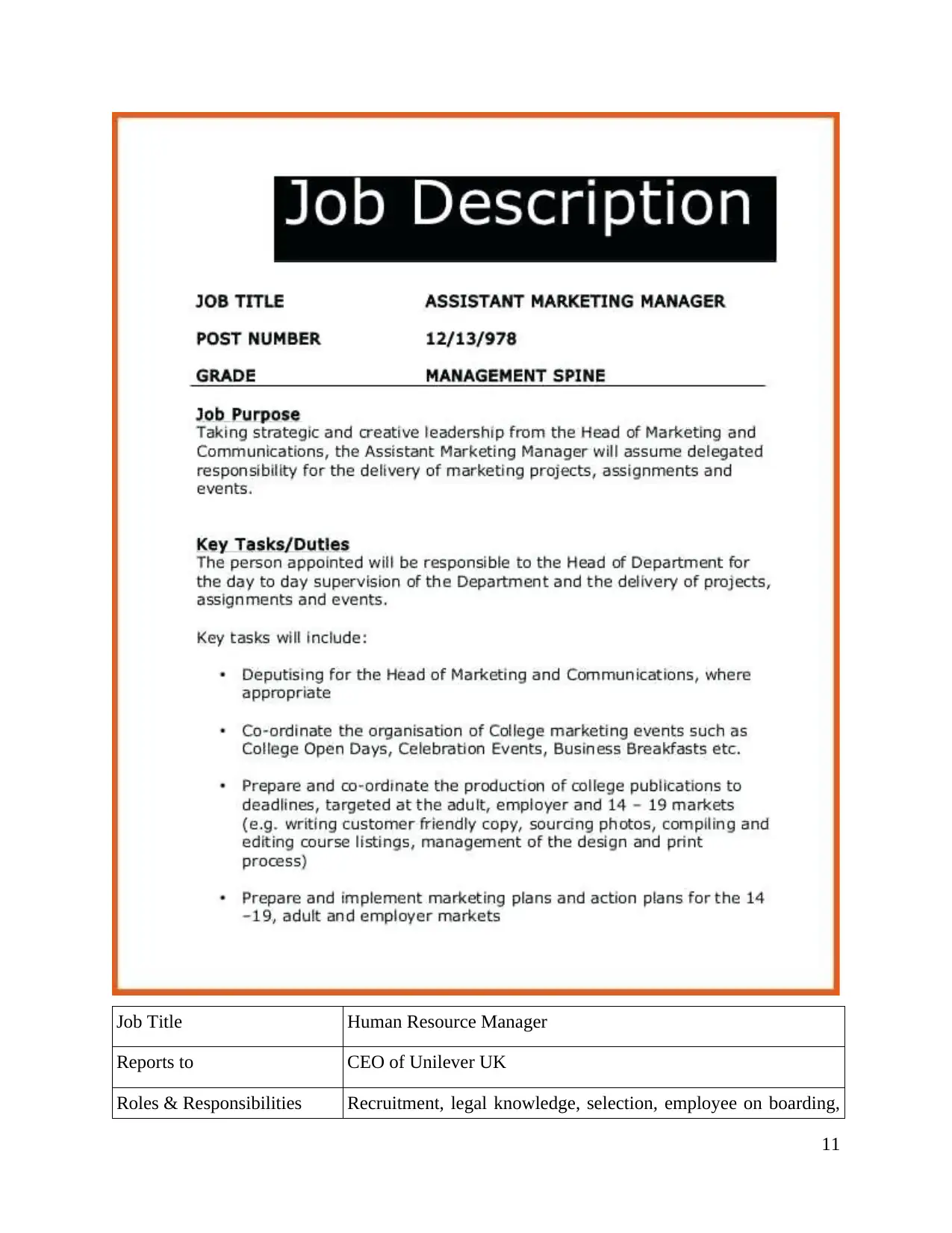
Job Title Human Resource Manager
Reports to CEO of Unilever UK
Roles & Responsibilities Recruitment, legal knowledge, selection, employee on boarding,
11
Reports to CEO of Unilever UK
Roles & Responsibilities Recruitment, legal knowledge, selection, employee on boarding,
11
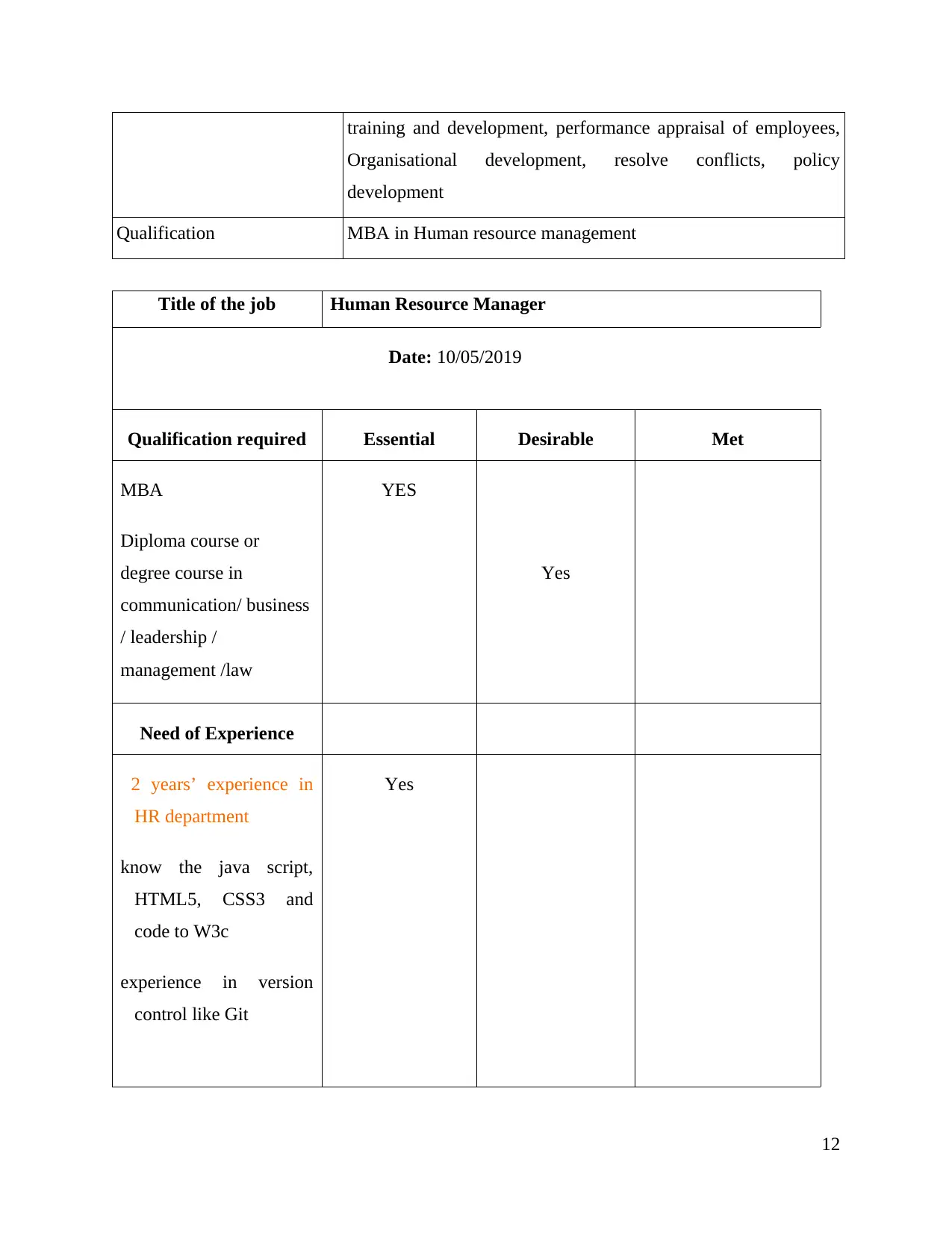
training and development, performance appraisal of employees,
Organisational development, resolve conflicts, policy
development
Qualification MBA in Human resource management
Title of the job Human Resource Manager
Date: 10/05/2019
Qualification required Essential Desirable Met
MBA
Diploma course or
degree course in
communication/ business
/ leadership /
management /law
YES
Yes
Need of Experience
2 years’ experience in
HR department
know the java script,
HTML5, CSS3 and
code to W3c
experience in version
control like Git
Yes
12
Organisational development, resolve conflicts, policy
development
Qualification MBA in Human resource management
Title of the job Human Resource Manager
Date: 10/05/2019
Qualification required Essential Desirable Met
MBA
Diploma course or
degree course in
communication/ business
/ leadership /
management /law
YES
Yes
Need of Experience
2 years’ experience in
HR department
know the java script,
HTML5, CSS3 and
code to W3c
experience in version
control like Git
Yes
12
⊘ This is a preview!⊘
Do you want full access?
Subscribe today to unlock all pages.

Trusted by 1+ million students worldwide
1 out of 20
Related Documents
Your All-in-One AI-Powered Toolkit for Academic Success.
+13062052269
info@desklib.com
Available 24*7 on WhatsApp / Email
![[object Object]](/_next/static/media/star-bottom.7253800d.svg)
Unlock your academic potential
Copyright © 2020–2025 A2Z Services. All Rights Reserved. Developed and managed by ZUCOL.





